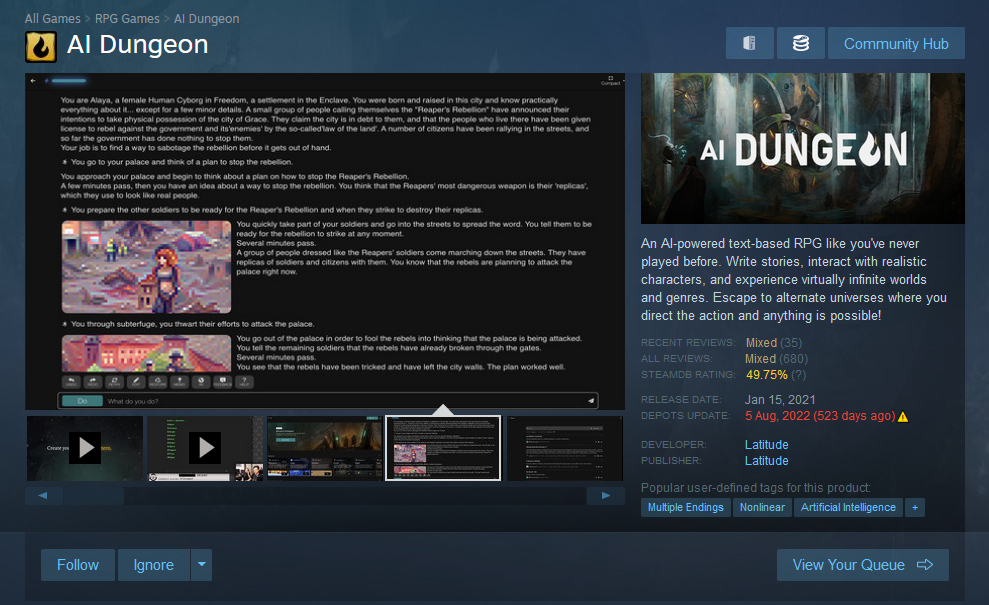Steam’s New AI Policy Might Just Ruin PC Gaming
I hope you like shovelware!

2024 is here, and AI is going nowhere. AI chatbots are quickly taking over the internet, computer-generated art books are hitting Instagram, and PC gaming’s biggest store is easing its policy on AI. That’s right: Steam is about to see a wave of AI content, at least according to industry experts.
Valve updated its official stance on AI in January, and it’s left gamers, artists, and journalists concerned over the future of gaming on Steam. So, what’s the new Steam Store policy on AI, and how will it affect your relationship with the platform?
Did Steam originally reject games with AI content?
Whispers surfaced around Steam’s AI policy in June 2023, after a developer with content “obviously AI generated” received a notice from Steam. At the time, Steam told that developer that it “cannot ship games for which the developer does not have any of the necessary rights.”
“After reviewing, we have identified intellectual property in [Game Name Here] which appears to belongs to one or more third parties,” the developer wrote on Reddit, formatting from the author. “In particular, [Game Name Here] contains art assets generated by artificial intelligence that appears to be relying on copyrighted material owned by third parties. As the legal ownership of such AI-generated art is unclear, we cannot ship your game while it contains these AI-generated assets, unless you can affirmatively confirm that you own the rights to all of the IP used in the data set that trained the AI to create the assets in your game.”
After tweaking the content within the game to hide “obvious” signs of AI development, Steam ultimately rejected the Redditor’s game. “At this time, we are declining to distribute your game since it’s unclear if the underlying AI tech used to create the assets has sufficient rights to the training data,” Steam wrote.

One month after the original Reddit post, Valve told GamesIndustry.biz that it was “continuing to learn about AI,” its application in gaming, and how it relates to “our process for reviewing games submitted for distribution on Steam.” Valve didn’t necessarily “discourage the use of it on Steam,” it wrote. Instead, Steam pointed to “copyright law and policies” as an issue for the platform.
“The introduction of AI can sometimes make it harder to show a developer has sufficient rights in using AI to create assets, including images, text, and music. In particular, there is some legal uncertainty relating to data used to train AI models. It is the developer’s responsibility to make sure they have the appropriate rights to ship their game,” Steam told GamesIndustry.biz. “We welcome and encourage innovation, and AI technology is bound to create new and exciting experiences in gaming. While developers can use these AI technologies in their work with appropriate commercial licenses, they can not infringe on existing copyrights.”
So yes, Steam originally declined games where it could not necessarily verify that the user had the rights to the AI-generated content in question. This was hailed as a victory at first, but things changed in January.
Steam’s new AI policy, explained

On Jan. 9, 2024, Steam updated its AI policy via the Steamworks Development page. In the post, Valve acknowledged that it “needed some time to learn about the fast-moving and legally murky space of AI technology,” but the company had since made up its mind. Now, Steam declared that its new policy would “enable us to release the vast majority of games that use” AI.
According to the post, when game developers enter a new game for approval on Steam, they must clarify how, exactly, AI is used in the product. These are separated into “pre-generated” and “live-generated” AI content categories—games where in-game material underwent AI assistance, and games where AI is used to create new content as the player interacts with the game, respectively. Think of this like using Stable Diffusion or Midjourney to create art assets in development, versus implementing ChatGPT, KoboldAI, or another large language model (LLM) directly into your game.
“Under the Steam Distribution Agreement, you promise Valve that your game will not include illegal or infringing content, and that your game will be consistent with your marketing materials,” Steam writes of pre-generated content. As for games with real-time AI content generation, Steam utilizes the same pre-generated rules, and expects developers to “tell us what kind of guardrails you’re putting on your AI to ensure it’s not generating illegal content.”
Valve is still banning adult-oriented sexually explicit content created with live-generated AI, stating the company is “unable to release that type of content right now.” Likewise, Steam will offer players the ability to report games creating “illegal content” via live AI generation. But otherwise, Steam apologized for its delay on its AI policy, essentially delivering a major victory to developers and publishers embracing AI-generated content.
“Today’s changes are the result of us improving our understanding of the landscape and risks in this space, as well as talking to game developers using AI, and those building AI tools,” Steam said. “This will allow us to be much more open to releasing games using AI technology on Steam.”
Will Steam’s new AI policy ruin the gaming platform?

Over the past few years, Steam’s “shovelware” issue has gotten out of control. Low quality games keep hitting the Steam Store, imbued with minimal effort for maximum profit. Consumers can no longer expect Steam to curate its store for the best PC gaming experience possible; they must carefully judge the quality and merit of a game based on reviews, additional external research, and the first two hours in their purchase’s refund window—not exactly the ideal gaming experience.
Unfortunately, Steam’s new AI policy has left many in the gaming community nervous, fearing this brand new approach to computer-generated content will worsen the shovelware problem. It’s like we’re looking at the AI-generated equivalent of a septic tank exploding.
That’s essentially how Aftermath sees it. Pointing to OpenAI’s very own claim that it required copyrighted material to create its AI-generation technology, writer Luke Plunkett noted that Valve had “today decided to say f*ck it” and welcome games with AI content anyway, despite major “legal uncertainties surrounding the data used to train AI models.”
“[W]ait until every second-rate management, exploration, survival, and strategy game is full to the brim with machine-generated models and artwork, and you’re talking to characters spewing machine-generated lines back at you,” he wrote. “Just like machine-generated imagery itself, in 6-18 months we’re going to be up to our eyeballs in soulless, derivative games full of crud smooshed together by a computerized casserole dish.”
Industry professionals have shared similar takes on social media. Visual novel developer ebi-hime suggested the Steam AI policy would simply lead to “more hentai slider games,” a notoriously low-effort shovelware genre already flooding Valve’s site. Meanwhile, indie developer Konrad Pawlikowski argued the proliferation of AI generation on Steam would make it “much harder to find success,” as these AI games “will take up any little exposure us small guys yet.”
Other industry workers, creators, and video game fans believe higher quality content will simply beat out shovelware on Steam, which is plausible. Despite the sheer amount of “hentai slider games” on Steam, indie games regularly go viral on the platform thanks to word of mouth and the Steam Store algorithm. Lethal Company dominated Steam in 2023, for example, despite the game’s humble origins and minimal marketing.
Still, it seems Steam is happy to allow AI content on its platform as long as Valve won’t get in trouble for showcasing illegal or sensitive material in games. Get ready for Midjourney, OpenAI, and Stable Diffusion to dominate your Steam Store. We’re staring down a wave of low-quality games flooding the market, and it’ll be up to gamers to figure out how to sort out the human-created material from the AI-generated junk.
(featured image: Photo by Tomohiro Ohsumi/Getty Images)
Have a tip we should know? [email protected]